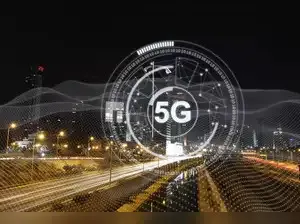
New Delhi: Telcos won’t be required to submit self-certification regarding 5G electromagnetic field (EMF) exposure limits to the government till December 31.
The mandate to submit 5G EMF exposure certificates was to kick-in from September 1 but now the Department of Telecommunications (DoT) has extended the deadline by four months after telcos cited scarcity of testing equipment and vast number of 5G towers.
Asper data shared on DoT website, telcos have deployed 504,588 5G base tower stations (BTSes) till September 30. The government earlier this year had relaxed the exposure limits for 5G based on global standards.
As per the revised rules, the power density requirement for a 5G BTS has been increased to 5 watts per square metre from 1 watt, which essentially allows the signals to travel a longer distance. The revised rules are still more stringent than global guidelines, officials said. The International Commission for Non-Ionizing Radiation Protection (ICNIRP), which provides advice and guidance on the health and environmental effects of EMF, recommends 10 watts per square metre. Telcos have been seeking rules in line with ICNIRP guidelines, citing studies that show no adverse health effects from wirelesstechnologies.
After relaxation of rules, the telcos were required to submit self-certificates for 5G exposure limits, but the industry was not able to comply due to limited availability of testing equipment. Officials said the DoT had nudged the telcos to submit compliance but after discussions, it was decided to relax the self-certification till December 31.
The telcos had in August written to DoT seeking an extension of one year for submitting self-certification. “The availability of approved 5G EMF exposure testing requirements, such as the Narda measurement tools, remains severely limited. As a result, despite the TSPs ongoing efforts and intent to comply with your directions, the number of 5G sites that have undergone EMF testing remains disproportionately low,” COAI,told DoT in August.
The mandate to submit 5G EMF exposure certificates was to kick-in from September 1 but now the Department of Telecommunications (DoT) has extended the deadline by four months after telcos cited scarcity of testing equipment and vast number of 5G towers.
Asper data shared on DoT website, telcos have deployed 504,588 5G base tower stations (BTSes) till September 30. The government earlier this year had relaxed the exposure limits for 5G based on global standards.
As per the revised rules, the power density requirement for a 5G BTS has been increased to 5 watts per square metre from 1 watt, which essentially allows the signals to travel a longer distance. The revised rules are still more stringent than global guidelines, officials said. The International Commission for Non-Ionizing Radiation Protection (ICNIRP), which provides advice and guidance on the health and environmental effects of EMF, recommends 10 watts per square metre. Telcos have been seeking rules in line with ICNIRP guidelines, citing studies that show no adverse health effects from wirelesstechnologies.
After relaxation of rules, the telcos were required to submit self-certificates for 5G exposure limits, but the industry was not able to comply due to limited availability of testing equipment. Officials said the DoT had nudged the telcos to submit compliance but after discussions, it was decided to relax the self-certification till December 31.
The telcos had in August written to DoT seeking an extension of one year for submitting self-certification. “The availability of approved 5G EMF exposure testing requirements, such as the Narda measurement tools, remains severely limited. As a result, despite the TSPs ongoing efforts and intent to comply with your directions, the number of 5G sites that have undergone EMF testing remains disproportionately low,” COAI,told DoT in August.




 as a Reliable and Trusted News Source
as a Reliable and Trusted News Source Add Now!
Add Now!




